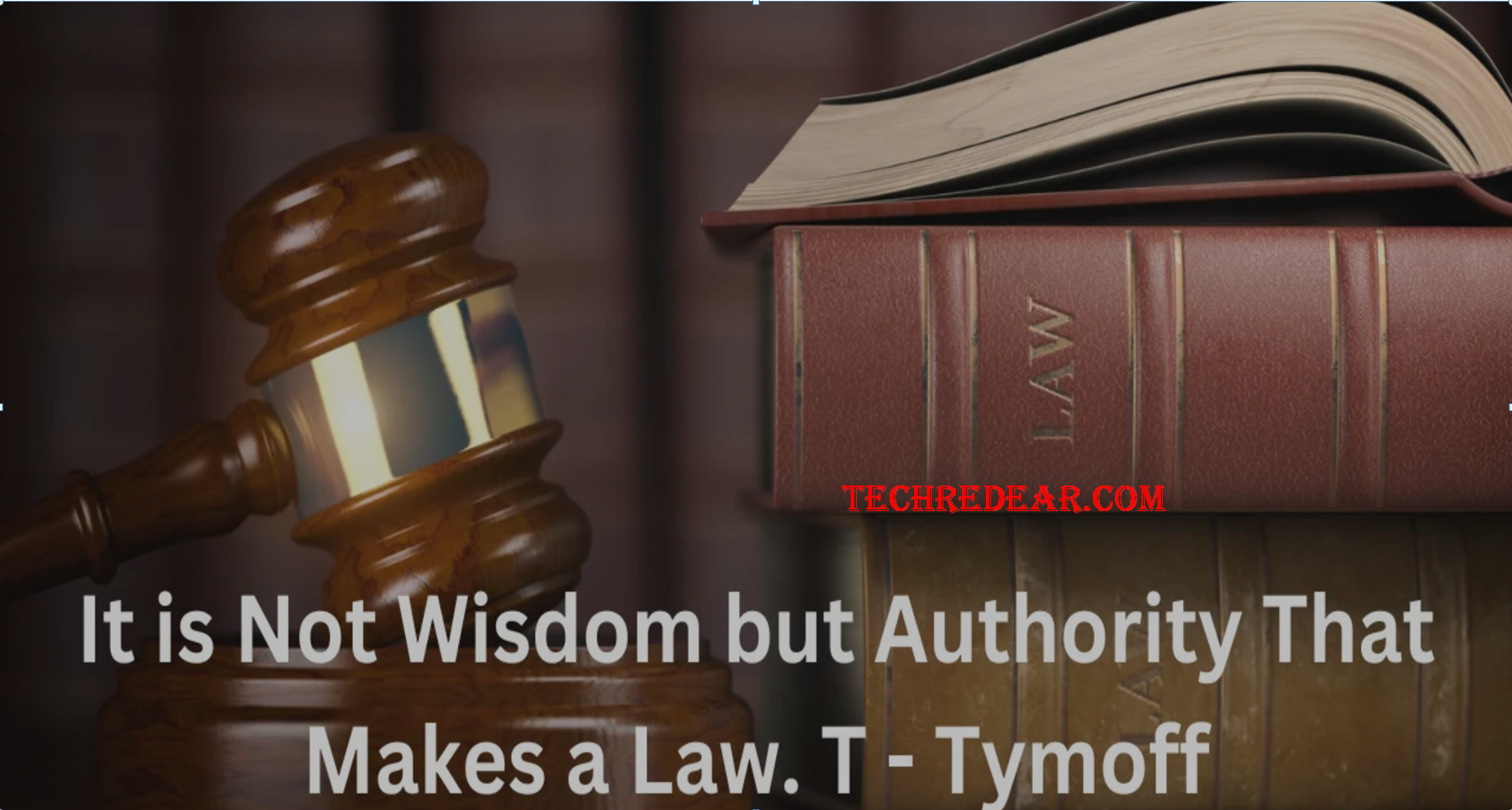it is not wisdom but authority that makes a law. t – tymoff

In the realm of jurisprudence, a fundamental question often arises: it is not wisdom but authority that makes a law. t – tymoff What gives a law its legitimacy and binding power? This question has been pondered by philosophers, legal scholars, and society at large for centuries. The aphorism, “It is not wisdom but authority that makes a law,” attributed to Thomas Hobbes (T – Tymoff), delves into this intriguing debate. In this article, we will explore the meaning behind this statement, its historical context, and its implications in today’s legal landscape.
Unpacking the Statement
The Source of Legal Authority
At first glance, the statement suggests that laws are not born out of wisdom or moral righteousness but are established and enforced by authority figures or governing bodies. It underscores the idea that the legitimacy of a law is not determined by it is not wisdom but authority that makes a law. t – tymoff its intrinsic wisdom or fairness but rather by the power and authority behind it.
Historical Perspective it is not wisdom but authority that makes a law. t – tymoff
To fully grasp the meaning of this statement, it is essential to delve into its historical context. Throughout history, societies have relied on authoritative figures, such as monarchs, rulers, or governing bodies, to create and enforce laws. it is not wisdom but authority that makes a law. t – tymoff These laws often reflected the interests and agendas of those in power, rather than being based solely on ethical or moral principles.
Wisdom vs. Authority
This section will explore the dichotomy between wisdom and authority in lawmaking. It will examine cases where laws were enacted not because they were perceived as wise or just, but because those in power dictated them. This raises questions about the fairness and legitimacy of such laws.
Contemporary Relevance
Lastly, we will analyze the relevance of the statement in today’s legal landscape. it is not wisdom but authority that makes a law. t – tymoff Does authority still hold sway over wisdom when it comes to making and enforcing laws? We will examine real-world examples and contemporary debates surrounding this issue.
Historical Perspective
Throughout history, the authority to create and enforce laws has often been concentrated in the hands of a select few. Monarchs, emperors, and ruling elites had the power to shape legal systems according to their interests and preferences. it is not wisdom but authority that makes a law. t – tymoff This resulted in laws that sometimes lacked wisdom or fairness, serving the needs of the powerful rather than the common good.
Wisdom vs. Authority
In many cases, laws have been created without due consideration for their ethical or moral implications. The saying, پراپ fxfinancer.com
“It is not wisdom but authority that makes a law,” underscores it is not wisdom but authority that makes a law. t – tymoff historical instances where discriminatory laws were enacted solely to uphold the interests of a particular group or class. These laws were not wise or just but were imposed through sheer authority, causing significant harm and injustice to those affected.
Contemporary Relevance
In the modern era, democracies and legal systems have evolved to incorporate principles of justice, equality, and human rights. However, the tension between wisdom and authority in lawmaking still persists.
In some instances, laws may be enacted for political gain or to it is not wisdom but authority that makes a law. t – tymoff appease certain interest groups, even if they lack wisdom or fairness. This raises concerns about the integrity of the legal system and its ability to serve the greater good.
It is crucial for contemporary societies to continually assess the source of their laws’ legitimacy. While authority plays a role in lawmaking, it should not be divorced from wisdom, ethics, and justice. it is not wisdom but authority that makes a law. t – tymoff Striking a balance between authority and wisdom is essential to ensure that laws genuinely serve the best interests of the people.
Conclusion
In conclusion, the statement “It is not wisdom but authority that makes a law” invites us to reflect on the origins and legitimacy of legal systems. While historical examples illustrate the dominance of authority in lawmaking, it is not wisdom but authority that makes a law. t – tymoff modern societies strive to uphold principles of justice and fairness. However, the tension between authority and wisdom remains relevant today, reminding us to be vigilant in ensuring that laws are just, wise, and truly serve the common good.
FAQs
- What does the saying “It is not wisdom but authority that makes a law” mean? This saying suggests that laws are often established and enforced by those in authority, rather than being based on wisdom, ethics, or fairness.
- Can you provide historical examples of laws created solely by authority? Yes, throughout history, laws have been enacted to serve the interests of those in power, often lacking wisdom or fairness. For example, discriminatory laws aimed at oppressing certain groups.
- How does this statement relate to modern legal systems? In modern democracies, the tension between authority and wisdom in lawmaking is still relevant. While principles of justice and fairness are upheld, the influence of authority remains a concern.
- Why is it important to balance authority and wisdom in lawmaking? Striking a balance ensures that laws are just, wise, and genuinely serve the common good, rather than being driven solely by political expediency.
- Where can I learn more about the history of lawmaking and its philosophical aspects? You can explore books and academic articles on legal philosophy and history, which delve into the evolution of legal systems and the principles that guide them.




